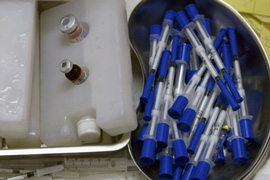Iraq’s unsung immunisation heroes
Health workers in uphill battle to save children from malnutrition and disease.

|
|
|
More than 8000 vaccinators are taking part in the immunisation programme [GALLO/GETTY] |
Iraqi health workers and the United Nations Children’s Fund (Unicef) have launched a large-scale immunisation drive to protect 3.9 million Iraqi infants against measles, mumps and rubella (MMR).
Keep reading
list of 4 itemsDeadly Sahel heatwave caused by ‘human-induced’ climate change: Study
Woman, seeking loan, wheels corpse into Brazilian bank
UK set to ban tobacco sales for a ‘smoke-free’ generation. Will it work?
But up to one million children have been prevented from receiving their routine immunisation due to roadblocks, curfews, poorly equipped hospitals and conflict.
Roger Wright, Unicef’s special representative for Iraq, said: “One million Iraqi children now have no protection against measles as a result of insecurity and falling immunisation rates.”
More than 8,000 vaccinators have become involved in the immunisation programme in one of Iraq’s biggest humanitarian operations in the last two years.
Measles kills more children worldwide each year than any other vaccine-preventable disease, but is easily prevented by immunisation.
Iraq‘s ministry of health has organised the MMR campaign as part of Iraq’s long-term measles elimination plan, with consultative support from Unicef and the World Health Organisation (WHO) and financing from the European Commission.
Claire Hajaj, Unicef Iraq’s communication chief, said: “The national immunisation drive has thus far reached 90 per cent of the target. However, in Baghdad the figure is only 54 per cent, mainly because of insecurity.
“In Baghdad we operate a fixed strategy, where families are directed to vaccination centres, not one whereby vaccinators move from house to house, like in many other Iraqi provinces.
“It is simply not safe enough for people to move around in Baghdad. As a result, the fact that children are open to disease is a direct cost of the conflict.”
Naeema Al-Ghasser, the WHO’s representative for Iraq, said: “Insecurity in Iraq has increased the risk of a widespread measles epidemic that could claim the lives of up to 10 per cent of infected children.
“All children between 12 and 59 months everywhere in Iraq need to be immunised, even if they have had the vaccine before. The vaccine is safe and effective, and gives lifelong immunity against measles.”
Unreported cases
In addition to the fear of moving around the capital city, many Iraqi families have become internally displaced, which has made it very difficult for vaccinators to determine those who have been immunised and those that haven’t.
Hajaj said: “Almost 15 per cent of the Iraqi population has moved since 2003; 700,000 since the Samarra bombing. As a result, it is hard to keep track of where these families are.
“Some areas have become desolate, while some areas have become flooded with an overwhelming demand for vaccinations.”
Despite difficulties, Iraq’s measles elimination plan has been remarkably successful to date, reducing measles cases from 9,181 in 2004 to fewer than 500 reported in 2006.
However, Unicef and the WHO have said that many cases go unreported due to Iraq’s current state of affairs.
Daniel Toole, Unicef’s director of emergency programmes, said the humanitarian situation for all Iraqi children is a self-perpetuating cycle of distress:
“Escalating violence prevents many from attending school. Access to safe water and other basic social services continues to decline due to insecurity, population movement, a loss of skilled workers and the weakening of vital infrastructure.
“Diarrhoea outbreaks in the summer months are a real danger. The risk of major disease outbreaks grows daily.”
|
|
|
Unicef says it needs $20 million in humanitarian aid for Iraq’s children [GALLO/GETTY] |
Unicef said that it needs $20 million to provide humanitarian aid for Iraq’s children today, of which only $2.2 million has been received to date.
Toole said that the problem stems from fear: “We cannot ensure widespread health services if women are afraid to take their children to clinics; we cannot hope for full school enrolment and participation if families are afraid to send their children to school.
“We cannot hope for improved health and nutrition if civilians risk their lives simply shopping for groceries.”
Local courage
In previous immunisation drives, vaccinators have been killed. Although no deaths have been reported in the current drive, Hajaj said workers involved in the delivery of medicine have been killed.
“One incident took place last week where two workers delivering vaccines to support centres were ambushed and killed in Diyala province.”
Unicef and WHO work closely with local people to help plan and strategise the vaccination process in Iraq, but Hajaj emphasised the importance and bravery of local people working as vaccinators.
“The only security they have is their face in the community and their courage.
When they’re moving around they have cars to transport them, when they need to go on foot, they go on foot.
“These people aren’t put in these areas by the WHO or Unicef. In the majority, they are local people operating in very dangerous communities.
“They live in these areas, they know the families and care to support the community and help to protect the children. They are doing it because it’s their home.”
Wright said: “We have a short window of opportunity to give children lifelong protection against a dangerous disease … This MMR campaign must proceed unhindered and unite everyone for children’s sake.

